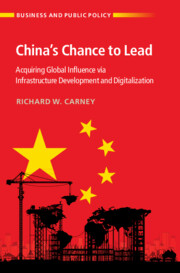
-
Select format
-
- Publisher:
- Cambridge University Press
- Publication date:
- 02 November 2023
- 16 November 2023
- ISBN:
- 9781009385879
- 9781009385886
- 9781009385855
- Dimensions:
- (229 x 152 mm)
- Weight & Pages:
- 0.698kg, 386 Pages
- Dimensions:
- (229 x 152 mm)
- Weight & Pages:
- 0.56kg, 386 Pages
You may already have access via personal or institutional login
Book description
How is China acquiring global influence? Rather than focusing exclusively on China's interests, this book considers a vital but overlooked feature – the interests of recipient countries. Richard W. Carney argues that countries in which political leaders rely more heavily on clientelism coupled with greater control over the corporate sector have a higher demand for Chinese infrastructure spending. Through a combination of statistical analyses and case studies, Carney shows that electoral autocracies (in contrast to closed autocracies, electoral democracies, and liberal democracies) display these features most prominently and are the most avid recipients. This in turn contributes to elevated levels of Chinese digital technologies imports which facilitates the spread of Chinese technical standards, enabling China to create the scale to assert its dominance over the emerging digital economy. Electoral autocracies are the most prevalent type of regime, and are therefore essential partners to China's global ambitions.
Awards
Winner, 2024 Choice Awards
Reviews
‘Why do some countries receive Chinese investments directed towards infrastructure while others do not? In this informative, well-argued and richly documented book, Richard Carney moves beyond stale, outdated explanations that ignore the nuances associated with both infrastructure investment and autocratic rule. Carney argues that China seeks to own and control infrastructure projects in electoral autocracies such as Malaysia due to basic incentive compatibility: their rulers must compete in frequent, albeit rigged, elections, and thus welcome clientelistic spending because of, not despite, its inefficiencies and opaqueness. Perhaps the most important contribution is Carney's ample documentation of China's efforts to dominate standard setting around digital technologies associated with the unfolding Fourth Industrial Revolution. The stakes could not be higher.’
Victor Menaldo - Professor, University of Washington and Co-founder and co-director of the UW Political Economy Forum
‘A focused, detailed scholarship on China’s Belt and Road initiative that is sorely needed. Carney’s address of why countries participate in the BRI, and why and how China engages them, is particular interesting. Both the argument and evidence are convincing and compelling.’
David C. Kang - Maria Crutcher Professor of International Relations, University of Southern California
‘Developing countries are growing more than twice as fast as advanced economies and will soon account for two-thirds of global GDP. For multinational corporations, it is vital to establish operations in these markets. Chinese organizations possess novel forms of competitive advantage that Western firms are still learning to adapt to. With truly comprehensive evidence, Richard Carney shows where Chinese firms are most eagerly welcomed for their decades-long commitments to build and maintain infrastructure projects which in turn grants other Chinese firms privileged access to the fast-growing demand for digital technologies. ‘China’s Chance to Lead’ is essential reading for executives looking to understand China’s newly influential role among developing countries and the accompanying opportunities and risks.’
Allan Gabor - President Merck China, EVP Electronics
‘Where Carney’s contribution … excels is in reminding us that the world on which many university and business school curricula have been designed no longer exists. China’s rise is taken seriously now. Yet, China is not alone. State capital is in ascendence everywhere and the liberal foundations of markets are fragile. Our theories must keep up.’
Adam D. Dixon Source: Political Science Quarterly
‘… a well-structured academic work that provides a systematic theoretical explanation, clear and measured indicators, and rigorous empirical analyses.’
Alvin Camba Source: The Developing Economies
Contents
Metrics
Altmetric attention score
Full text views
Full text views help Loading metrics...
Loading metrics...
* Views captured on Cambridge Core between #date#. This data will be updated every 24 hours.
Usage data cannot currently be displayed.
Accessibility standard: Unknown
Why this information is here
This section outlines the accessibility features of this content - including support for screen readers, full keyboard navigation and high-contrast display options. This may not be relevant for you.
Accessibility Information
Accessibility compliance for the PDF of this book is currently unknown and may be updated in the future.


